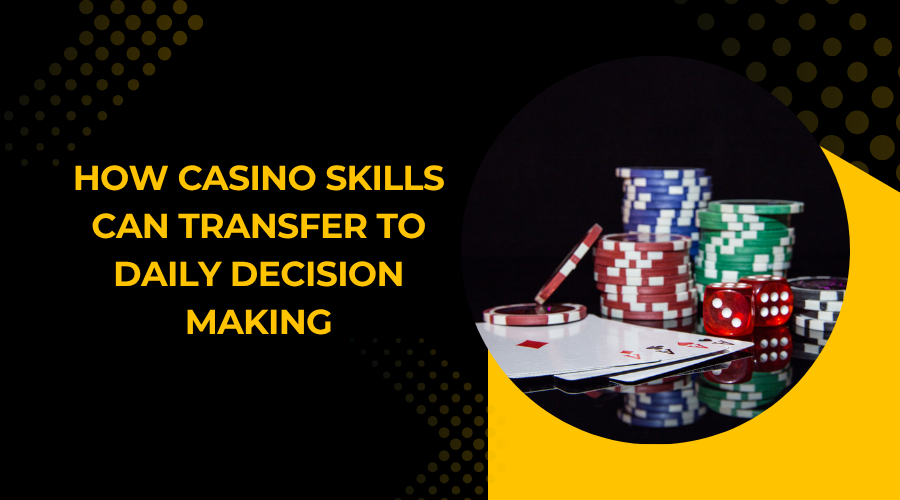How Casino Skills Can Transfer to Daily Decision Making

The decisions made at casino tables reflect many of the choices encountered in everyday life. Managing risk while playing blackjack or deciding when to fold in poker involves strategies rooted in assessing probabilities, managing resources, and reading fast-changing situations. These strategic habits can apply beyond the gaming floor, as strategic wagering develops analytical thinking and emotional stability that are useful in other areas.
Anyone who avoids chasing losses at the casino often uses a similar approach when sticking to a budget or turning down risky offers, showing a shared framework for rational assessment across different tasks. Regular self-evaluation translates to better learning from past decisions and making smarter choices outside the game.
Casino settings also require quick thinking under pressure, strong self-control, and the ability to act despite incomplete information. These abilities prove useful well beyond gaming, supporting a disciplined approach to managing financial risks and handling negotiations where not all details are available.
Frequent play in casino environments allows players to sharpen their ability to weigh odds under time limits or with little data. Decision-making skills improve through hands-on experience across different formats, including slots, table games, and live dealers. GT Bet Casino offers various game types where players can practice these adaptive skills.

50% Bonus up to $1000

150% Bonus - Reduced Juice

Reduced Juice Lines (-105)
The Psychology Behind Casino Decision-Making
Cognitive skills triggered during a casino game offer practical benefits. Playing activates parts of the brain focused on understanding probability, finding patterns, and evaluating risks. However, research from UBC shows that sensory cues in casino environments can reduce attention to odds and increase arousal, sometimes impairing judgement and leading to riskier decisions.
Consistent strategic play increases both the speed and accuracy of decision-making, as experience at the tables builds a feedback system where each action leads logically to an outcome.
Separating Emotion from Logic for Better Outcomes
The difference between emotional and rational decision-making stands out in casino play. Impulse-driven actions such as doubling a bet out of frustration after a loss ignore statistical reasoning and proven strategies. These mistakes often result in unnecessary losses.
Emotional choices increase the risk of repeated bad outcomes, either at the table or when making a big purchase out of stress. Seeing how emotion disrupts logical thinking in gaming highlights the same risk in work or financial life.
Bankroll Management Principles for Personal Finance
The discipline of bankroll management used by successful casino players ties directly to sound personal finance. Those who track their gaming spend precisely tend to use this same approach in managing household budgets and long-term savings. Setting a loss limit during casino sessions introduces the discipline of building boundaries into everyday spending.
For example, a player who restricts any single-game risk to a small percentage of their total bankroll follows a principle similar to setting aside money for emergencies or large purchases in everyday life. This method keeps losses manageable and plans on track.
Common pitfalls in both casino and financial management include chasing losses, failing to track expenses accurately, and making decisions based on emotion rather than data. Seeing these patterns helps players form stronger financial habits in both contexts.
Risk Tolerance Assessment Techniques
Casino games provide a practical setting for learning about personal risk tolerance. Emotional responses to high or low bets highlight individual comfort levels and help reveal natural inclinations toward risk and caution. This knowledge directly affects other financial decisions, from selecting investments to planning significant purchases.
Someone who feels anxious over a lost blackjack hand might prefer safer investment products instead of those with more volatility. Analysis of failure informs intelligent betting similar to informed real-life choices.
Matching Game Choices with Personal Risk Profiles
Both casino players and investors gain from structured approaches to measuring risk tolerance. Tracking emotional reactions at varying bet sizes during play, or using formal risk-profile questionnaires in finance, helps identify personal comfort zones. Once this information is clear, it becomes easier to make better-aligned choices in either situation.
Pattern Recognition and Statistical Thinking
Frequent casino play improves the brain's ability to notice patterns and think statistically. Practice makes it easier to spot trends and understand the meaning behind sequences, sharpening the ability to distinguish genuine opportunity from pure coincidence or superstition.
This type of thinking helps when professionals observe changes in financial markets or when individuals notice useful patterns in daily decision-making. Seeing the line between real signals and randomness, such as resisting the belief that a roulette wheel landing on red several times means black is "due", supports sound decision-making in any setting.
Overcoming Cognitive Biases
Casino games present practical examples of classic thinking errors. The gambler's fallacy, where players expect random outcomes to self-correct, and confirmation bias, where wins seem more meaningful than losses, both become clearer with experience. Reviewing results and questioning basic assumptions builds awareness that can help overcome these biases, on the tables and in daily life.
Applying smart strategies like keeping detailed records helps reduce bias. Consciously testing ‘gut’ feelings is also effective in both gaming and daily decisions.Writing down reasons for important decisions before acting, then comparing expectations against actual outcomes, exposes patterns of faulty logic.
Checking actions during gameplay improves self-awareness. Taking time to record what has been done, why, and the results makes it easier to catch errors as they occur. Outside casinos, this might involve making a checklist before major purchases or leaving records to review big decisions once emotions have settled.
Emotional Control Under Pressure
Emotional control developed at the casino carries over into other demanding life situations. The discipline to stay calm during wins or losses supports more measured responses wherever stress levels run high. Players rely on steadiness techniques, such as pausing before decisions, sticking to pre-set rules, or focusing on the process instead of only outcomes.
With practice, these methods build consistency under pressure and protect against snap choices made from emotion rather than reason.
Staying Consistent When Stakes Are High
Strategic play builds the ability to maintain balance during uncertain times. Honest self-review and continuous practice of emotional regulation learned from casino sessions assist in handling anxiety, building resilience, and avoiding overreactions during challenging real-world events.
Self-Assessment: Are Your Casino Skills Transferring to Real Life?
Consider these questions to evaluate how your casino experience might be improving your daily decision-making:
Do you find yourself more patient when facing uncertainty in work or personal situations? Can you calculate risks more effectively before making financial commitments? Have you noticed improved emotional control during stressful conversations or negotiations?
The frameworks built through strategic play at places like GT Bet Casino become most practical when intentionally applied to daily challenges. Try comparing your decision process for a recent purchase with how you approach a casino game to identify similarities and potential improvements in both areas.
Chat 
Rules
The goal of chat is to talk sports and sports betting! Help each other by sharing picks and having a good time!
Below will not be tolerated
You can chat about most things to a certain extent. Exception is absolutely NO talking about Religion or Politics.
- There will be NO talking about others or their families
- There will be NO name calling.
- There will be NO rambling on or repeating the same thing over and over.
- There will be NO racist or sexist comments.
- There will be NO posting of other websites.
Basically treat others the way you would like to be treated.
Break the rules

- 1st warning a 24 hour ban
- 2nd warning 7 day ban
- 3rd warning a lifetime ban




